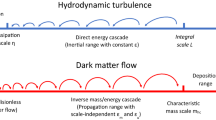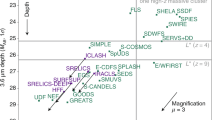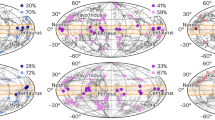Abstract
THE first important formula in Eddington's “Fundamental Theory” (Cambridge, 1946) is (p. 6)  where R0 is the radius of an Einstein universe, N the number of particles and σ the uncertainty constant of the physical origin. Einstein's formula for the total mass, considered as equivalent to ½N hydrogen atoms each of mass m, gives the independent relation (p. 10):
where R0 is the radius of an Einstein universe, N the number of particles and σ the uncertainty constant of the physical origin. Einstein's formula for the total mass, considered as equivalent to ½N hydrogen atoms each of mass m, gives the independent relation (p. 10):  From (1) and (2):
From (1) and (2):  and Eddington finds Lemaître's limiting speed of recession of the galaxies, V0 = c/(R0√3), to be 572 km./sec. per megaparsec. For this “most accurate” determination, he uses in (3) his formula for 1/σ as numerical multiple of the Rydberg constant. The ‘observed’ recession-factor he estimated (1944) to be 560 km./sec. per megaparsec, in agreement with his result.
and Eddington finds Lemaître's limiting speed of recession of the galaxies, V0 = c/(R0√3), to be 572 km./sec. per megaparsec. For this “most accurate” determination, he uses in (3) his formula for 1/σ as numerical multiple of the Rydberg constant. The ‘observed’ recession-factor he estimated (1944) to be 560 km./sec. per megaparsec, in agreement with his result.
This is a preview of subscription content, access via your institution
Access options
Subscribe to this journal
Receive 51 print issues and online access
$199.00 per year
only $3.90 per issue
Buy this article
- Purchase on Springer Link
- Instant access to full article PDF
Prices may be subject to local taxes which are calculated during checkout
Similar content being viewed by others
References
Phil. Mag., (7), 38, 299 (1947).
cf. Hubble, E. P., Observatory, 73, 102 (1953).
Author information
Authors and Affiliations
Rights and permissions
About this article
Cite this article
SLATER, N. Recession of the Galaxies in Eddington's Theory. Nature 174, 321–322 (1954). https://doi.org/10.1038/174321a0
Issue Date:
DOI: https://doi.org/10.1038/174321a0
Comments
By submitting a comment you agree to abide by our Terms and Community Guidelines. If you find something abusive or that does not comply with our terms or guidelines please flag it as inappropriate.



